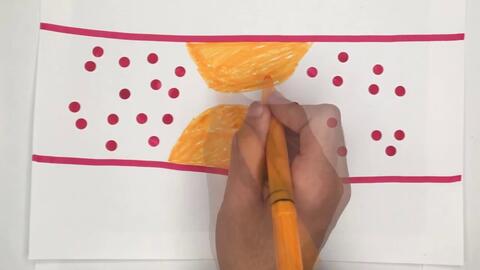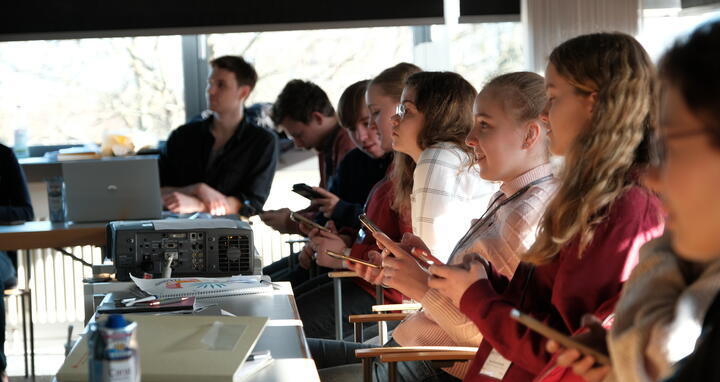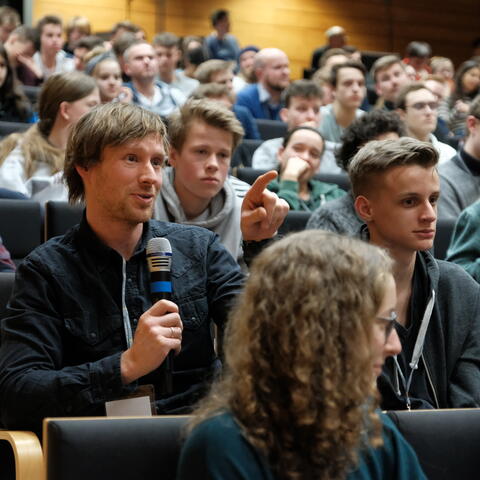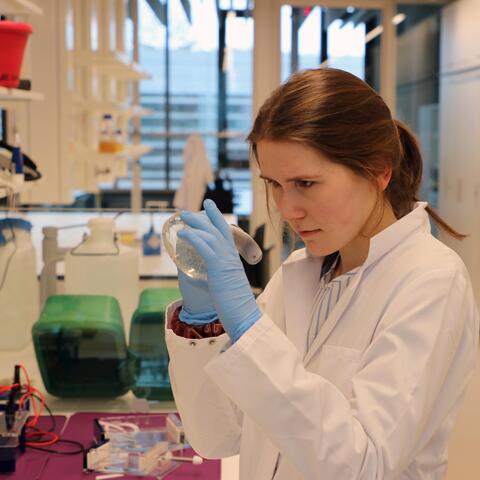📺 First Digital Forum brings young researchers to the MDC
Automation and digitization have long become part of the laboratory work – which is also the case at the MDC – and are changing many processes and structures.
What is the role of bioinformatics in cancer research? How does artificial intelligence contribute to face recognition programs? Which study programs are available in the fields of Science, Technology, Engineering and Maths (STEM, in German: MINT)? For two days, students from the “Das Nationale Excellence-Schulnetzwerk MINT-EC” and winners of the "Jugend forscht" competition learned more about research and careers in the age of digitization at the Digital Forum that took place at the Max Delbrück Center for Molecular Medicine in the Helmholtz Association (MDC). In addition to the MDC, 15 other companies, institutes and institutions offered workshops and lectures.
"Automation and digitization have long become part of the laboratory work – which is also the case at the MDC – and are changing many processes and structures. At the Digital Forum, we would like to give interested young people authentic insights into basic medical research and show how our researchers deal with new and exciting challenges of digitization," said Professor Heike Graßmann, MDC Executive Board Member for Administration.
A practical second day
Around 250 students, 60 teachers and 15 "Jugend forscht" award winners visited the Digital Forum 2020.
The participants had two days to gain information about studies and career options, listen to theoretical lectures and take part in practical workshops. The Forum started with presentations from MDC research group leaders Professor Oliver Daumke and Dr. Roland Schwarz on membrane proteins in cells and the evolution of cancer cells. Not only pupils from the MINT-EC network, but also "Jugend forscht" award winners, who were honoured for biology projects, listened to the lectures at the first day. Kerrin Bielser from Hamburg handed in a bioinformatics project at the "Jugend forscht" competition last year. Her highlight of the forum was the lecture on microbiome analyses: The speaker Theda Bartolomaeus explained how she and her colleagues identify different bacteria from the intestine with the help of DNA databases. "We use bioinformatics methods to compare the genome sequence of an unknown bacterium with sequences of known microorganisms," said the PhD student from the research group of Dr. Sofia Forslund at the MDC and ECRC. The sequence data of many bacteria have been collected by researchers from all over the world in digital databases and can be accessed online by any scientist. Bartolomaeus is convinced: "Without digitization our laboratory could not work at all."
The second day was practical. 26 workshops for pupils from the school network took place all over Berlin. In cooperation with the Karlsruhe Institute of Technology (KIT), participants let water lilies grow in a virtual pond, and the Siemens AG turned the young people into dance teachers for robots. In several MDC working groups, one or two pupils each were allowed to conduct experiments in the lab under the guidance of the researchers.
Johanna Beining chosed the workshop "Research LIVE!" at the Digital Forum and conducted a diagnostic test in the lab.
Johanna Beining were at the Institute for Medical Systems Biology (BIMSB) of the MDC and visited the research group of Dr. Michael Kaminski. There she used a CRISPR diagnostic test to detect a mutated gene that can cause kidney disease. "It’s great that I could see a clear result at the end of the day. With the help of this CRISPR-Cas method, I was actually able to identify the gene in a sample," says the 18-year-old student from Trier, who is going to study biomedical chemistry in Mainz after her high school graduation. Scientists from the research groups of Dr. Roland Schwarz, Dr. Dario Jesus Lupianez Garcia, Professor Uwe Ohler, Dr. Altuna Akalin, Professor Nikolaus Rajewsky, Dr. Jana Wolf, Dr. Sofia Forslund, Professor Norbert Hübner and Professor Matthias Selbach also supervised a MINT-EC student in the laboratory for one day.
These students were awarded for a biological research project in the "Jugend forscht" competition and met at MDC in February.
The "Jugend forscht" award winners got practical experiences as well. They visited the Berlin Ultrahigh Field Facility (B.U.F.F) and viewed a 7 Tesla magnetic resonance (MR) scanner. Under the microscope, in the research groups of Professor Oliver Daumke and Professor Walter Birchmeier, they saw protein crystals and kidney organoids – tiny organ precursors that have developed from stem cells. "The lab work in small groups was really exciting," said Jolanda Schumann from Berlin. All participants were allowed to separate proteins using affinity chromatography – a method that isolates a single molecule from a solution using a specific binding property. "This enabled us to learn about the individual topics and methods, such as protein purification and crystallography, in a completely different way.”
Evening event and competition
The MINT-EC students had time to chat about their experiences of the day during a dinner on Friday night. At the closing ceremony all participants in the hall voted for the best video clip in English language. The video competition from MINT-EC and British Council aims to motivate young people to learn English in MINT areas as well. The first prize was awarded to two students from the German International School Washington D.C. with an explanatory video on the health consequences of the eating habits of US children and adolescents.
The "Jugend forscht" award winners' meeting and the Digital Forum took place for the first time at the MDC in 2020. The MINT-EC event was funded by the German Federal Ministry of Education and Research (BMBF) and the MDC. Similar programs for young researchers who are enthusiastic about MINT, for example the MINT400 or internships of "Jugend forscht" award winners took place at the MDC several times.

All viewers* of the school slam at Digitalforum 2020 voted this clip as the winning entry.
Further informations
- Press release from MINT-EC about the Digital forum (in German only)
- MINT400 2018 at the MDC
- „Research can be addictive“
- Jugend forscht: Participants and their projects (in German only)






